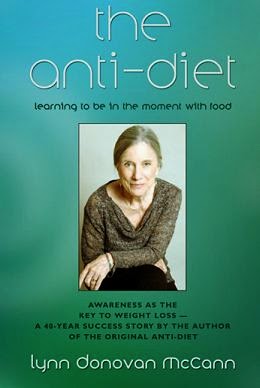“Mind What You Eat: Can ‘intuitive eating’ be as effective as calorie counting?" (Gretchen Reynolds for The New York Times Magazine, 11/22/15) got me all excited. Reynolds cites a study conducted by Judith C. Anglin and published in Nutrition and Health that compared weight loss success between subjects who cut calories and subjects who ”practiced intuitive eating – a program, according to intuitiveeating.org, guided by 10 principles like ‘Reject the diet mentality,’ ‘Honor your hunger,’ and ‘Make peace with food.’” At last! I thought, and read eagerly, until Anglin’s blunt conclusion that sensitivity to internal cues alone will not keep weight off for the long haul. She says: “Calories matter.”
I beg to disagree. Of course weight loss can be achieved without counting mathematical abstractions. I published a book about this in 1971. I completely revised and republished “The Anti-Diet: learning to be in the moment with food” after forty five years of maintaining a desirable weight just by listening to my gut.
I beg to disagree. Of course weight loss can be achieved without counting mathematical abstractions. I published a book about this in 1971. I completely revised and republished “The Anti-Diet: learning to be in the moment with food” after forty five years of maintaining a desirable weight just by listening to my gut.
What’s wrong with Anglin’s study and others like it? Well, for one thing, it was much, much too short. It spanned just 6 weeks (with a follow-up at 9). That’s hardly time enough to re-wire the brain for a discipline of focus rather than restraint, to undo years of ingrained guilt, to send the mental clutter of misinformation about what is good or bad for you to the recycle bin. It took me a good 6 months to make a turnaround back in 1967. Fine-tuning awareness in eating (or any important human function) is a lifelong process. It doesn’t follow a straight line, and it differs for every individual.
Anglin’s study was designed around Tribole and Resch’s well-respected program that systematizes many of the fundamentals I discovered on my own. But, programs must be “followed,” and studies are inherently “controlled.” I can’t imagine doing the kind of thorough, quirky, and intensely individual work I did to revitalize my relationship with food while being scrutinized, interviewed, and weighed on a weekly basis. You have to really want to give mindfulness a wholehearted try. It’s an inside job, an enormous lesson in self-trust and “letting go.” Signing up 16 distractible college students for 6 weeks (and maybe paying them a small stipend) is a set-up for negative results. It couldn’t begin to measure the effectiveness of intuitive eating, as I understand it.
The results of my own, successful 45-year “study” strongly suggest that our innate capacity to know when, what, and how much we want to eat is actually sufficient, probably for most of us. Hasty conclusions to the contrary only benefit the quick fix gurus and hucksters of often dangerous remedies that put overeaters even further out of touch. They perpetuate learned habits of eating that are also promoted and reinforced by institutions we like to think of as reliable.
To understand how medical research, the food industry, and the government have contributed to mindless eating on a national scale, may I recommend NinaTeicholz’s “The Big Fat Surprise.” There is a link between this important book and the stubborn resistance to alternatives to conventional dieting like the ones Evelyn Tribole and Elyse Resch (of intuitiveeating.org) and I offer. And, while we wait for widespread acceptance of the simplest, most natural, most logical way to lose weight and keep it lost, enjoy Karen Wexler’s delightful book, “Having My Cake.” Our day will come.
Lynn Donovan McCann


No comments:
Post a Comment